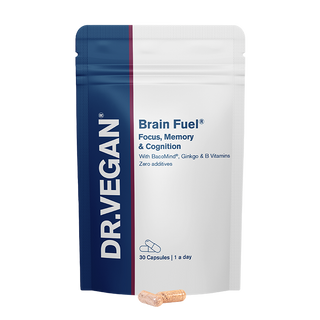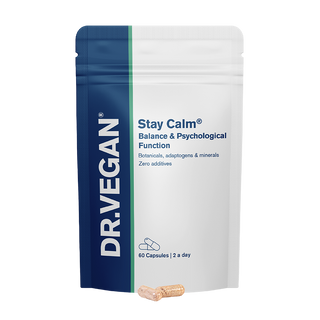How to improve brain fog

We've all had those moments when our thoughts seem to drift into a hazy fog, leaving us feeling mentally sluggish and disoriented. This phenomenon is commonly known as 'brain fog', but what does it feel like and what are its potential causes? Shona Wilkinson delves into the causes and symptoms, and discusses effective strategies to clear the mist and regain mental clarity.
What is brain fog?
Brain fog is more than just a buzzword; it is a term used to describe a cognitive impairment characterised by confusion, forgetfulness, mental fatigue and difficulty concentrating. It can make your thoughts feel clouded, as if you're wading through a mental haze.
What's your diet missing? Create your free Diet Profile.
What does brain fog feel like?
Brain fog feels like your mind is wrapped in a dense fog, making it challenging to focus, remember information or think clearly. It's akin to trying to find your way through a thick forest with limited visibility.
MenoFriend®

How long does brain fog last?
The duration of brain fog can vary widely, from fleeting moments to persistent spells that may last hours or even days. Morning brain fog, which occurs upon waking, is a common experience and often dissipates as the day progresses.
You may be interested in 'How your diet can help your sleep'.
Stages of brain fog
Brain fog can manifest in various stages, ranging from mild forgetfulness and difficulty concentrating to more severe cognitive impairment. Identifying the stage of brain fog you're experiencing can help pinpoint its cause and guide effective interventions.
Brain fog vs. dementia and cognitive decline
Brain fog is typically a temporary and reversible cognitive impairment often associated with fatigue, stress or other underlying factors. Dementia and cognitive decline, on the other hand, are progressive conditions characterised by more severe and long-lasting memory and cognitive deficits.
Causes of brain fog
Several factors can contribute to brain fog:
- Stress and anxiety: High stress levels can lead to mental fatigue and clouded thinking. In our customer survey of 545 people, 78% experienced stress or anxiety at least once a week.
- Lack of sleep: Sleep deprivation can impair cognitive function and contribute to brain fog. In our latest customer survey on sleep, we found that a shocking 73% of people have trouble sleeping at least 3 nights a week.
- Menopause and perimenopause: Hormonal changes during menopause can disrupt sleep patterns and contribute to brain fog. Learn about the '12 most common symptoms of menopause' and discover MenoFriend®, a natural formula to help with menopause.
- Dietary factors: Low-carb diets can lead to insufficient glucose supply to the brain, resulting in brain fog, mood swings and decreased concentration. Discover the link between your gut and brain and 'How your diet can improve your mental health'.
- Nutritional deficiencies: Deficiencies in vitamins, minerals or essential nutrients like omega 3 fatty acids can affect cognitive function.
- Allergies and sensitivities: Allergic reactions or sensitivities to certain foods or environmental factors can trigger brain fog.
- Chronic illness: Conditions like fibromyalgia, chronic fatigue syndrome and autoimmune diseases are often associated with brain fog.
You may also be interested in reading 'Nootropics: Everything you need to know'.
Common signs and symptoms of brain fog
- Difficulty concentrating or staying on task.
- Forgetfulness and memory lapses.
- Mental fatigue and low energy levels.
- Feeling disoriented or mentally 'foggy'.
- Mood swings, including irritability and depression.
- Physical symptoms like headaches, nausea and muscle fatigue.
How to clear brain fog
- Diet: Incorporate brain-supporting foods rich in antioxidants, omega 3 fatty acids and vitamins. A balanced carbohydrate intake is essential for a steady supply of glucose to the brain. Read more on how your diet can help fuel your memory, focus and concentration, and help overcome brain fog. You may also be interested in 'Foods to help boost energy and reduce stress' and foods that lower cortisol. Explore the worst foods for memory and brain fog.
- Supplements: Omega 3 supplements, B vitamins and adaptogens like ashwagandha may help alleviate brain fog. You may be interested in our Brain Health Bundle, including our Vegan Omega 3 and Brain Fuel®, an advanced nootropic formula of B-Vitamins and clinically proven ingredients, including BacoMind®, Phosphatidylserine and Ginkgo to improve your memory, focus and cognitive performance. A customer survey of customers taking Brain Fuel® daily for 3 months showed they enjoyed:

*based on a user rating from month 0 to month 3, across 40 individuals.
- Lifestyle changes: Prioritise quality sleep, engage in regular physical activity and practice stress management techniques like meditation or yoga. Discover 'Foods and vitamins to help relieve anxiety'.
- Hydration: Dehydration can contribute to brain fog, so ensure you're drinking enough water throughout the day.
- Allergen management: Identify and address any food or environmental allergies or sensitivities.
- Mental health: Seek support for anxiety, depression or other mental health issues that may be exacerbating brain fog. Uncover '5 Mood Boosting Foods to Improve Mental Health'.
Brain fog is a common but often manageable cognitive phenomenon that can be caused by a range of factors, from stress and lack of sleep to dietary choices and hormonal changes. Understanding the potential causes and symptoms of brain fog is the first step towards regaining mental clarity. By adopting a holistic approach that includes diet, lifestyle changes, and, if necessary, supplements and medical interventions, you can lift the fog and restore mental sharpness and focus to your life.
*Based on a UK 3 month survey conducted by DR.VEGAN® of 40 customers, nationally representative, during January 2024. All customer survey findings reflect our own efforts and have not been influenced or verified by any external organisations or third-party entities.
You may also enjoy reading:
- How stress and anxiety affects the heart
- 8 things to keep calm, healthy and happy right now
- Mushrooms and brain health
Discover our range of award-winning vegan supplements and probiotics.
Want to hear more from our nutritionists? Sign up to our email newsletter for insights and exclusive offers:



















